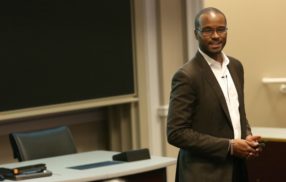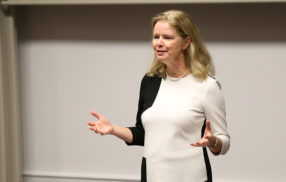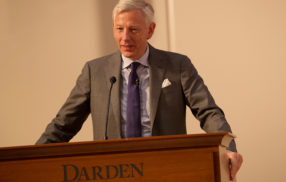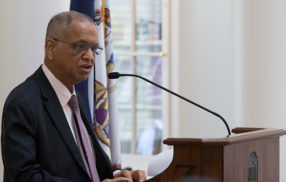Danaher Executive Vice President Shares 10 Leadership Skills for General Managers
By Dave Hendrick
Great general managers are made via a combination of education and experience, although the routes they take to effective leadership can vary widely.
William “Dan” Daniel II (MBA ’91), executive vice president of the industrial conglomerate Danaher, recounted his own path to general management — a job he summarized as “actively managing our companies to try to make them better for customers, associates and shareholders”— at a recent Leadership Speaker Series event at the University of Virginia Darden School of Business.
The Indiana native said few should expect to be a general manager immediately out of school, and noted the value in amassing a diverse skill set at initial positions, no matter the field. He encouraged Darden MBAs to be flexible, and ultimately prioritize the organization rather than the position when choosing an initial job.
Daniel recounted his own first post-Darden stop at the automotive manufacturer Arvin, where he initially worked in operations on a muffler assembly line in east Tennessee, working the line with people who might not have had an MBA, but had similar aspirations and expectations of work. Daniel stayed at Arvin for 19 years, gaining sales and operations experience before moving into general management. Seeking a new challenge, he moved to Danaher, where he has served in a variety of roles over the past 12 years and currently heads up the company’s diagnostics and dental businesses.
Daniel said his experience as a general manager proved relevant and applicable even without intimate knowledge of health care or life sciences companies. The effective general manager is able to bring a handful of practices that are relevant to any business.
To that end, Daniel offered students what he described as the 10 key leadership skills for a general manager:
- Build teams
- Effective communications — both speaking and listening
- Ability and agility
- Humility and confidence
- Persuasion and authority
- Honesty and candor
- Be a teacher and student
- Value and leverage differences
- Passion and hard work
- Live a balanced life
At Danaher, which is composed of more than 20 distinct operating companies, Daniel said the organization lives the Kaizen mindset of continuous improvement. Noting the outperformance of the company’s shareholder returns compared to benchmark averages, Daniel said the company “focuses on delivering long-term value by delivering short-term execution each week, month and quarter.”
“It’s about a mindset, and continuous improvement is at the core of that,” Daniel said. “Progress is measured in decades.”
Playing to the home crowd, Danaher also vouched for the quality of the many Darden graduates the company has hired and continues to seek.
“We hire MBAs every year, and it’s definitely the case that our Darden grads are among the best,” Daniel said. “Why? They fit in. They’re humble. They work hard. They are broad thinkers.”
Daniel said building teams and designing the teams for the future were among the most important tasks for a leader, and in his own role as executive sponsor for Danaher’s Diversity and Inclusion Council.
“In today’s world where innovation is as critical as it’s ever been, it has been proven that diverse teams create better solutions,” Daniel said.
And while diversity can often be measured, true inclusion can be trickier to achieve.
“Inclusion is about recognizing people’s full capabilities, letting them know they are valued and helping them realize their full potential,” Daniel said.
The executive vice president said he believed diversity and inclusion are as important to organizations today as lean business practices were in the late 1980s. And just as lean proponents prospered while many of those following an older playbook fell behind, Daniel said he believed a similar dynamic would play out when it comes to diversity and inclusion.
Said Daniel, “My experience in working with our leaders on diversity and inclusion over the last few years has made it very obvious this is a critical ingredient for success.”
The University of Virginia Darden School of Business prepares responsible global leaders through unparalleled transformational learning experiences. Darden’s graduate degree programs (MBA, MSBA and Ph.D.) and Executive Education & Lifelong Learning programs offered by the Darden School Foundation set the stage for a lifetime of career advancement and impact. Darden’s top-ranked faculty, renowned for teaching excellence, inspires and shapes modern business leadership worldwide through research, thought leadership and business publishing. Darden has Grounds in Charlottesville, Virginia, and the Washington, D.C., area and a global community that includes 18,000 alumni in 90 countries. Darden was established in 1955 at the University of Virginia, a top public university founded by Thomas Jefferson in 1819 in Charlottesville, Virginia.
Press Contact
Molly Mitchell
Associate Director of Content Marketing and Social Media
Darden School of Business
University of Virginia
MitchellM@darden.virginia.edu








